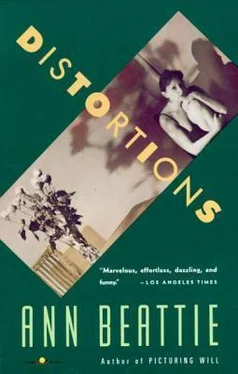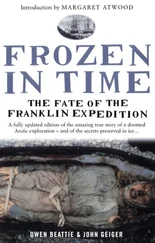Ann Beattie - Distortions
Здесь есть возможность читать онлайн «Ann Beattie - Distortions» весь текст электронной книги совершенно бесплатно (целиком полную версию без сокращений). В некоторых случаях можно слушать аудио, скачать через торрент в формате fb2 и присутствует краткое содержание. Год выпуска: 1991, Издательство: Vintage, Жанр: Современная проза, на английском языке. Описание произведения, (предисловие) а так же отзывы посетителей доступны на портале библиотеки ЛибКат.
- Название:Distortions
- Автор:
- Издательство:Vintage
- Жанр:
- Год:1991
- ISBN:нет данных
- Рейтинг книги:5 / 5. Голосов: 1
-
Избранное:Добавить в избранное
- Отзывы:
-
Ваша оценка:
- 100
- 1
- 2
- 3
- 4
- 5
Distortions: краткое содержание, описание и аннотация
Предлагаем к чтению аннотацию, описание, краткое содержание или предисловие (зависит от того, что написал сам автор книги «Distortions»). Если вы не нашли необходимую информацию о книге — напишите в комментариях, мы постараемся отыскать её.
Distortions — читать онлайн бесплатно полную книгу (весь текст) целиком
Ниже представлен текст книги, разбитый по страницам. Система сохранения места последней прочитанной страницы, позволяет с удобством читать онлайн бесплатно книгу «Distortions», без необходимости каждый раз заново искать на чём Вы остановились. Поставьте закладку, и сможете в любой момент перейти на страницу, на которой закончили чтение.
Интервал:
Закладка:
“Hello, Betty?” the second man says.
“Yes,” Sheila says.
“What ingredients go into an apple pie, Betty?”
“Apples. And sugar and flour.”
“Don’t you put in anything else, Betty?”
“Yes. Lemon juice. Sometimes raisins …”
“What else, Betty?”
“Uh-cinnamon. That’s all, I think.”
“But what accounts for the special goodness of your pies, Betty?”
“Nutmeg. I use … cinnamon and nutmeg.”
“Thanks, Betty. I’ll be ringing off now.”
The other man is standing in back of Wally, who is loudly whistling “Dixie.”
“Out!” he screams, and the two run from The Silver Slipper Café. The waitress screams. The police are called. Sometime during the confusion the cat wanders in.
“That was their cat!” the waitress says, pointing.
“Oh yeah?” one of the cops says. “I don’t think we’ve got anything on it, though.”
“You’re real comedians,” the waitress says angrily.
“This town just puts you in a good mood all the time,” the cop says. “You folks here for a little vacation in vacationland?”
“I don’t know what we’re here for,” David says, trying to comfort Sheila.
“Well, don’t lose what you already got,” the other cop says. He finishes writing something on a piece of paper, rolls up the paper, and holds the door open for his partner.
Marshall’s Dog


She was eighty-two when she died. She had the usual old-lady fears — Democratic Presidents, broken bones. When the spaghetti was snapped in half and dropped into the boiling water she heard the sound of her own bones cracking. She loved spaghetti. They had to eat so much spaghetti. She wouldn’t eat the sauce. She had butter with her spaghetti. She used to knit for her son, Marshall. She loved her son, she knitted all the time. Once she knitted him a bathrobe and he broke out in a rash all over, an allergy to wool. She cooked for Edna. She made alphabet soup. Edna remembers fishing out letters, saying, “Let’s see what Mom wants to tell us this time.” Fish. Fawn. Up. Dollar. She wouldn’t be left alone. When Edna went to work at the sporting-goods store she was there. At the store snowmobiles are sold, and wool hats, helmets, boots. Edna rode to work on her snowmobile; Marshall brought his mother in the car. She sat in a comfortable chair behind the counter and waited for Edna to finish work. She watched television. When customers came in, she turned up the volume. When the reception was bad, she listened to the radio instead. Marshall is talking to Edna. Edna has held the door open too long — the house is getting cold. Where is the dog? Didn’t she call the dog in? Edna closes the door. But then it’s open again — Edna and Marshall go out for a walk in the snow.
*
The boy at the table behind Mary is singing to her. He is no longer at the table behind her, he is at her table, and Kathy, her girlfriend, has gone to the bathroom. Now there is laughter in addition to the music. His friends are going crazy. They looked drunk when Mary and Kathy walked in an hour ago. One of the boy’s friends has a harmonica that he is blowing.
“Can you see?”
The boy has pulled the neck of his shirt down. Across his chest is a scattering of moles, a brown blur of them.
“It looks like the Milky Way galaxy,” he says. He waves his arm, motioning his friend to stop playing the harmonica. The music is replaced by a cappella singing. Kathy comes out of the bathroom and looks the situation over. She orders a Coke at the bar and returns to the table. Two summers ago, Mary danced for the boy and his friend. They paid her two dollars. Since then the boy’s friend lost a finger that got infected after he caught it in a mattress spring. He used to play electric guitar.
The waitress is at the table. Beverly tonight. Beverly has bright-blue eyes and wears blue eyeshadow. Her sister Miriam is on weekends. Miriam has green eyes and wears green eyeshadow.
“Miriam comin’ in Saturday night?”
Beverly puts the boy’s drink down.
“Rest of you want anything?” she says.
“Bring her a hamburger,” the boy says, nodding to Mary.
“Who’s paying for it?” Mary asks.
“I already paid,” the boy’s friend hollers. “They’re tradin’ hamburgers for fingers tonight. Tomorrow night there’s a spaghetti special.”
Laughter. An explosion of music. A dog has wandered into the bar. The dog is confused, running everywhere. Two women in a booth across the bar meow. Finally Sam sees the dog.
“It’s Marshall’s dog,” he says to Beverly. “Want to call him?”
“Take my toes,” the boy’s friend calls to Beverly. “I want a hot dog.”
“I’ll come back for your orders,” Beverly says over her shoulder.
“I’m leavin’!”
One of the boys is yelling. He has gotten up from the table. The dog has wandered over to their table. Mary recognizes the dog — her uncle’s. She reaches out to pat the dog, but the boy has grabbed the dog up into his arms. He starts to run.
“Did he pay?” Beverly hollers.
One of the boy’s friends holds up a wad of dollar bills.
“Well, what about the dog?” Beverly asks Sam.
“I told you,” Sam says. “Call Marshall.”
“He took it.”
“Tell Marshall.”
Beverly lifts the phone and dials.
*
“It’s Marshall, George. Things aren’t very good over here.”
“No? Is Mom’s cold still hanging on?”
“Yes and no. Edna took her to the doctor a week ago, and the medicine he gave her has helped. She gets around better. She’s depressed, though. Really, Edna wanted me to call you …”
“George,” Edna says, “she says that at night her heart stops, and if she’s very still it starts again. I know that isn’t true, but she’s very depressed. She’s cleaning out her drawers and gave me things to give you.”
George is speaking to Marshall again.
“The doctor recommends a cardiologist, but she says she won’t go. I think she’ll pay attention to you, George.”
“Anna and I’ll come over tomorrow night after work.”
“It’s no emergency. We wanted you to know.” Marshall lowers his voice. “Can you hear that?”
“Yeah. What is it?”
“The television and radio. She’s got them both going … stays right with them.”
“Wouldn’t the doctor give her sleeping pills?”
“She won’t take them.” Marshall hesitates. “What Edna told you about.”
*
Mrs. Anna Wright. She signs her name to a note she has written Mary’s homeroom teacher — an excuse for Mary’s absence from school on Monday and Tuesday. She writes so many notes. She feels obliged to offer details now. In this note she mentions a specific drug given to Mary by the doctor: penicillin. Rainy, cold weather, a sore throat, a tendency toward strep, penicillin. Her husband has told her to stop writing notes, but what is she supposed to do? Mary is overweight and embarrassed to go to school. The only place she socializes with boys is at Sam’s … they never ask her out. It is the week of the dance. If Mary isn’t in school, she can say that’s why she wasn’t invited. On Tuesday she made Mary dress for school. But she was crying; she couldn’t send her out of the house crying.
Now it is Wednesday. She didn’t think Mary would go to school, but she is dressed, sitting at the breakfast table. She cooks Mary a big breakfast — she doesn’t want to spoil her mood. George tells her to serve Mary only small portions, but he isn’t home when Mary eats, he doesn’t have to hear her complaints or watch the way she stalks out of the house, deliberately leaving her books behind on the hall table. Last week she had a big scene with Mary — not about breakfast or school, about the Parents’ Association. Mary said the Association was no good, that they spent their time thinking about parties and dances and that the guidance counselor was no good. Why couldn’t they do something about the guidance counselor? She had been surprised — what did Mary want to talk to a guidance counselor about? Mary had argued with her, saying that she didn’t understand anything, that it wasn’t only her — they all needed a good guidance counselor so they’d be able to get into college.
Читать дальшеИнтервал:
Закладка:
Похожие книги на «Distortions»
Представляем Вашему вниманию похожие книги на «Distortions» списком для выбора. Мы отобрали схожую по названию и смыслу литературу в надежде предоставить читателям больше вариантов отыскать новые, интересные, ещё непрочитанные произведения.
Обсуждение, отзывы о книге «Distortions» и просто собственные мнения читателей. Оставьте ваши комментарии, напишите, что Вы думаете о произведении, его смысле или главных героях. Укажите что конкретно понравилось, а что нет, и почему Вы так считаете.












